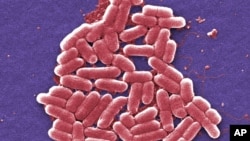A nightmare scenario long feared by U.S. public health officials has now occurred — and good intentions may have contributed to it.
Infectious-disease specialists are scrambling to identify the source of a bacterial infection in a Pennsylvania woman that does not respond to an antibiotic of last resort.
Thomas Frieden, head of the U.S. Centers for Disease Control and Prevention, said the development meant that "the medicine cabinet is empty for some patients. It is the end of the road for antibiotics unless we act urgently."
The Pennsylvania woman, 49, sought treatment last month at a military clinic for a urinary tract infection, and she was found to be harboring a strain of the bacterium E. coli that didn't respond to colistin, an antibiotic considered a drug of last resort against treatment-resistant “superbugs.”
Colistin is often the only drug that can treat a family of pathogens known as CRE, which officials call “nightmare bacteria” because they can kill up to 50 percent of people they infect.
The news was reported Thursday in Antimicrobial Agents and Chemotherapy, a journal of the American Society for Microbiology.
The E. coli strain in the Pennsylvania woman carried the dreaded resistance gene mcr-1, which circulates with ease among disease-causing microbes, also making them drug-resistant.
Microbes can mutate into forms that are less sensitive to highly specific antibiotics, avoiding destruction, if the drugs designed to kill them are misprescribed or taken incorrectly.
Possible sources
As U.S. officials try to hunt down the source of the woman’s drug-resistant infection, an expert in antibiotic resistance said it could have originated from a number of places.
Hermann Goossens, a professor of medical microbiology at the University of Antwerp in Belgium, said raw pork and pork products have been found to harbor bacteria with the mcr-1 mutation, so eating them can cause infection. Although the woman reportedly didn’t travel, people in Southeast Asia and China have been found to be infected with the colistin-resistant gene.
Goossens also said antibiotic prescribing practices, his specialty, should be reviewed. He said doctors who are trying to be helpful often prescribe antibiotics incorrectly or unnecessarily, encouraging bacterial mutations.
“We don’t have good diagnostic tests to detect the bacteria," he said, "so doctors just give antibiotics — a cocktail, if they are not sure what it is — and that’s all wrong. This has to change.”
Goossens said the case of the Pennsylvania woman, while serious, should not be cause for too much public alarm — at least not yet.
“It shouldn’t worry the public to such an extent that this is the end of, let’s say, the antibiotic era, that people are going to die now of infections, that they are going to die massively," he said. "This is a very rare event. It’s extremely rare; it’s not likely to spread very quickly and it is something that we see in other countries.”
Goossens said bacteria do not mutate rapidly and people can recover from infections without the use of antibiotics. He said that could be the case with the Pennsylvania woman, and U.S. officials said her infection was still treatable with other antibiotics.
Whether or not the nation's first colistin-resistant infection signals the end of the antibiotic era, doctors and public health officials are still concerned that the most powerful antibiotic in the drug arsenal may no longer be up to the challenge of superbugs.




